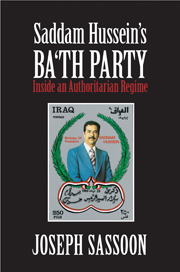Book contents
- Frontmatter
- Contents
- List of Figures and Tables
- Acknowledgments
- Note on Transliteration
- List of Abbreviations
- Glossary
- Map
- Introduction
- 1 The Rise of the Baʿth Party
- 2 Party Structure and Organization
- 3 The Baʿth Party Branches
- 4 Security Organizations during the Baʿth Era
- 5 The Baʿth Party and the Army
- 6 The Personality Cult of Saddam Hussein
- 7 Control and Resistance
- 8 Bureaucracy and Civil Life under the Baʿth
- Conclusion
- Appendix I Chart of the Structure of the Baʿth Party Secretariat (maktab amanat sir al-qutr)
- Appendix II Baʿth Party Statistics as of September 2002
- Notes on Sources
- Bibliography
- Index
- References
8 - Bureaucracy and Civil Life under the Baʿth
Published online by Cambridge University Press: 05 June 2012
- Frontmatter
- Contents
- List of Figures and Tables
- Acknowledgments
- Note on Transliteration
- List of Abbreviations
- Glossary
- Map
- Introduction
- 1 The Rise of the Baʿth Party
- 2 Party Structure and Organization
- 3 The Baʿth Party Branches
- 4 Security Organizations during the Baʿth Era
- 5 The Baʿth Party and the Army
- 6 The Personality Cult of Saddam Hussein
- 7 Control and Resistance
- 8 Bureaucracy and Civil Life under the Baʿth
- Conclusion
- Appendix I Chart of the Structure of the Baʿth Party Secretariat (maktab amanat sir al-qutr)
- Appendix II Baʿth Party Statistics as of September 2002
- Notes on Sources
- Bibliography
- Index
- References
Summary
To understand the complex relationship between the Baʿth Party and the population, one needs to examine the economic management of the country; the activities of the unions; the policy toward women; the focus on youth, students, and children; and finally, the politically motivated transformation from a secular state to a regime emphasizing religion. But first, it is important to analyze how the party interacted with the state bureaucracy and the regime's decision-making process.
Bureaucracy and Decision Making
The Baʿth regime in Iraq was determined from the outset to create “a powerful centralized national authority,” unlike many Third World countries in which a weak authority “is devoured by divisions” that render it shaky and ineffective. The party leadership, and in particular Saddam Hussein, succeeded in creating a large, centralized bureaucracy with the president at its apex. Besides his presidential role, Saddam Hussein was simultaneously the chairman of the RCC, secretary general of the Baʿth Party, prime minister, and commander in chief of the armed forces. Like his elaborate security apparatus, which had a systematic overlap in responsibilities in order to diffuse power, Iraq's bureaucracy had multiple organizational layers: the presidential diwan, the RCC, the party, and the cabinet, with its numerous ministries and quasi-governmental organizations. Fundamental to this structure was the idea that in the administration of the country no individual was able to know more than the president – or even as much as him – so that no one else could concentrate power in his hands.
- Type
- Chapter
- Information
- Saddam Hussein's Ba'th PartyInside an Authoritarian Regime, pp. 227 - 274Publisher: Cambridge University PressPrint publication year: 2011



